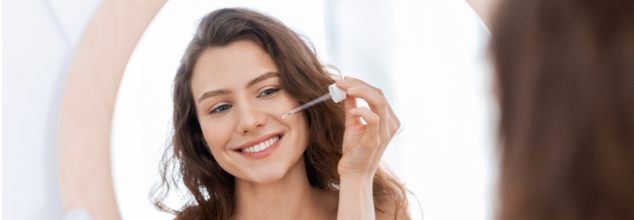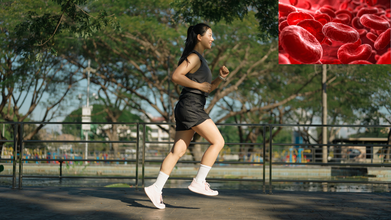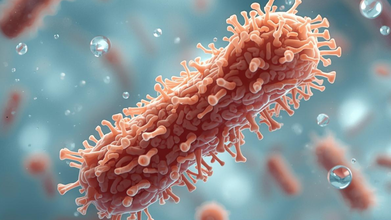- Health Conditions A-Z
- Health & Wellness
- Nutrition
- Fitness
- Health News
- Ayurveda
- Videos
- Medicine A-Z
- Parenting
Diwali Beauty: Hydration Hacks For Brighter, Healthier Skin

Diwali Beauty: 7 Hydration Tips For Brighter, Healthier Skin
As Diwali approaches, the excitement of festivities is often accompanied by challenges that affect our skin—Delhi’s rising pollution levels, indulgence in sweets, and busy social schedules all take a toll. Air pollution spikes during the festival, increasing toxins in the air, while sugary treats lead to breakouts and dull skin. Amidst all the socializing, little time is left for skincare.
But worry not! With the right hydration hacks, you can maintain your glow even during this hectic, pollution-heavy festive season. Some ancient-meets-modern hydration tips that can help protect your skin from pollution, balance indulgences, and keep you glowing all through Diwali:-
1. Pollution-Proof Your Skin with Antioxidant-Rich Hydration
With Delhi’s air quality taking a serious hit, your skin needs extra protection from free radicals. Hydration isn’t just about drinking water—it’s about feeding your skin with antioxidants to fight pollution.
Hack: Start your morning with a glass of warm water infused with turmeric and mint. Turmeric, known for its anti-inflammatory and antioxidant properties, helps detoxify your skin from within. Mint soothes inflammation caused by pollution, keeping your skin calm and hydrated.
Follow this up with a hydrating serum enriched with Vitamin C and hyaluronic acid to create a protective barrier against pollutants while keeping your skin plump and hydrated.
2. Combat Sugar-Induced Breakouts with Detox Water
Diwali is a time for indulgence, especially when it comes to sweets. But sugar can dehydrate the skin and cause breakouts. To counteract this, balance your hydration to flush out toxins and prevent sugar spikes from affecting your skin.
Hack: Sip on detox water throughout the day. Prepare water infused with cucumber, lemon, and ginger. Cucumber is a natural hydrator, lemon flushes out toxins, and ginger helps improve digestion, keeping your skin clear from within. This simple detox keeps your skin hydrated, reduces bloating, and combats sugar’s impact.
3. Quick Hydration for Busy Days with Facial Mists
Between family gatherings and festive socializing, your schedule leaves little room for elaborate skincare routines. Hydration on-the-go is essential to maintain that festive glow.
Hack: Carry a hydrating facial mist with you. Choose a mist that includes ingredients like rosewater, aloe vera, and hyaluronic acid. Spritz it on your face throughout the day to instantly refresh and hydrate your skin. The mist locks in moisture and helps counter the drying effects of pollution and makeup, keeping your skin fresh even after hours of socializing.
4. Overnight Skin Revival with Facial Oils
After a long day of celebrations and exposure to pollution, your skin craves intensive hydration and nourishment. The best way to restore it overnight is with facial oils that repair and hydrate while you sleep.
Hack: Before bed, apply a lightweight facial oil such as rosehip or almond oil. These oils are rich in antioxidants and fatty acids that help repair skin damage caused by pollution and soothe irritation from the day’s stress. Facial oils also lock in moisture, ensuring you wake up with hydrated, plump skin.
5. Protect from Pollution with DIY Anti-Pollution Masks
The high AQI during Diwali clogs pores, leading to dull and irritated skin. A simple mask can help draw out pollutants while hydrating your skin.
Hack: Create a DIY anti-pollution mask using bentonite clay and rosewater. Bentonite clay helps to detoxify by drawing out impurities, while rosewater hydrates and soothes your skin. Apply this mask once a week during Diwali to keep your skin deeply cleansed, hydrated, and glowing despite the pollution.
6. Hydrate from the Inside with Ghee and Nuts
Amid the sweets and rich foods, it’s easy to overlook the nutritional balance needed to keep your skin healthy. However, traditional foods can actually help hydrate and nourish your skin.
Hack: Incorporate ghee and a handful of nuts into your daily diet. Ghee, in moderation, is an excellent source of hydration and helps improve skin elasticity. Nuts like almonds and walnuts are packed with omega-3 fatty acids that hydrate the skin from within, helping to fight dryness caused by pollution and the festive season’s heavy foods.
7. Post-Party Skin Rescue with Aloe Vera and Cucumber Mask
After late-night Diwali parties, your skin needs a quick pick-me-up. With limited time to recover before the next event, a soothing and hydrating mask can work wonders.
Hack: Apply a DIY aloe vera and cucumber mask. Aloe vera heals and hydrates, while cucumber cools and de-puffs tired skin. This quick mask restores hydration and leaves your skin looking fresh and ready for another day of celebrations.
This Diwali, despite the pollution, sweets, and packed schedule, your skin can still glow with the right hydration strategies. By combining ancient wisdom with modern skincare practices, you can protect your skin from the harsh effects of the festive season. From antioxidant-infused waters to facial oils and DIY masks, these hydration hacks will help you maintain radiant, hydrated skin throughout the celebrations.
Let your skin shine as brightly as the festive lights—stay hydrated, stay glowing!
Cutting Back on Sugary Drinks Can Improve Teen Anxiety

Credit: Canva
A new study suggests that drinking sugary drinks can increase anxiety, among other mental issues, in adolescents by 34 percent.
Sugary drinks are known to be more harmful due to their low fiber, protein, or fat, which typically slow down digestion in solid foods. This means liquid sugar gets into your bloodstream very quickly, causing a sudden jump in blood sugar and insulin levels.
Hyper-fast intake of such drinks can also make it hard for your liver to process the sugar, especially the fructose part. n large amounts, fructose turns into fat in your liver. This buildup of fat is linked to metabolic problems that lead to Type 2 diabetes.
Apart from this, a Bournemouth University, UK literature review analyzed people aged between ten and 19 who drank fizzy drinks, colas, sweetened fruit juices, sweetened milk drinks, energy drinks, and sweetened tea or coffee and found multiple links between the beverages and anxiety diagnosis.
The gut-brain axis — the connection between the brain and the gut — may help explain the link between sugary drinks and anxiety. But gut health is influenced by many factors, including diet, stress, and sleep, which are also linked to anxiety.
Overall, the study suggests that cutting back on sugary drinks could help support teenagers’ mental health. While many studies have looked at how reducing sugary drinks improves physical health, more research is needed to see if it also benefits mental health.
READ MORE: Smoking Cannabis Can Lead To Mental Illnesses In Teenagers, Study Finds
WHO Asks Countries To Tax Sugary Drinks
The World Health Organization is asking countries across the world to increase taxes on sugary drinks and alcohol to reduce cases of chronic conditions such as Type 2 diabetes, obesity, heart disease and fatty liver.
In a January 13 virtual conference, WHO Director-General Dr Tedros Adhanom Ghebreyesus said: "Health taxes have been shown to reduce consumption of these harmful products, helping to prevent disease and reduce the burden on health systems.
"At the same time, they generate an income stream that governments can use to invest in health, education and social protection."
According to a recent report on sugar-sweetened beverages taxes, at least 116 countries tax sugary drinks, including sodas or carbonated canned drinks, but other high-sugar products, such as 100 per cent fruit juices, sweetened milk drinks and ready-to-drink coffees and teas, escape taxation.
Additionally, another report on alcohol taxes shows that even though 167 countries levy taxes on liquor, wine and beer, alcohol has become more affordable or remained unchanged in price in most countries since 2022, as taxes do not get adjusted for inflation and income growth.
How To Cut Back On Sugary Drinks?
Sugary drinks can feel addictive. If you find yourself hooked, try to slowly reduce how much you drink, just like you would with alcohol or tobacco. It helps to plan ahead for when you usually crave a soda.
You can start by mixing plain sparkling water with an equal amount of fruit juice or soda. Then, week by week, slowly reduce the amount of the sugary drink until you're mostly just drinking sparkling water. If it helps, add a little lemon or lime juice for flavor.
Running Ultra-Marathons Harms Your Red Blood Cells, Study Says

Credit: Canva
Participating in ultra-marathons can cause damage to your red blood cells' flexibility and hamper their oxygen-carrying capacity, a study suggests.
A study published in the American Society of Hematology’s journal Blood Red Cells & Iron notes that extreme forms of exercise may harm, rather than support, overall health.
In the case of ultra-marathons, runners experience breakdown of normal red blood cells during races. Over time, their red blood cells become less flexible and potentially reduce their ability to efficiently carry oxygen, nutrients and waste products throughout the body.
Travis Nemkov, associate professor in the department of biochemistry and molecular genetics at the University of Colorado Anschutz and the study’s lead author said of the results: “Participating in events like these can cause general inflammation in the body and damage red blood cells.
“Based on these data, we don’t have guidance as to whether people should or should not participate in these types of events; what we can say is, when they do, that persistent stress is damaging the most abundant cell in the body.”
Red blood cells transport oxygen and waste throughout the body and must be flexible enough to squeeze through small blood vessels. When red blood cells become inflexible or rigid, they lose their ability to deform and navigate through the body's smallest vessels, leading to impaired oxygen delivery, blockage of blood flow, and rapid destruction by the body's filtration system.
This can lead to low hemoglobin and anemia which can pave the way for diseases like Sickle Cell Disease (SCD), thalassemia, hereditary spherocytosis, and, in some cases, the "storage lesion" of blood in transfusion banks.
READ MORE: Ultra Marathoner Sufiya Sufi Runner: The Woman Who Set 5 Guinness World Records
What Is Low Hemoglobin?
Hemoglobin is the oxygen-carrying protein in red blood cells. Adequate hemoglobin levels are essential for keeping organs and tissues properly supplied with oxygen. Without enough of it, the body begins to struggle to meet its basic energy needs.
Low hemoglobin is usually identified through a blood test. It is most often measured as part of a complete blood count (CBC), which checks different components of the blood, including red and white blood cells and platelets, as per Healthline.
While exact reference ranges can vary slightly between laboratories, healthy adult hemoglobin levels usually fall within the ranges listed below. These values are different for babies, children, and teenagers:
- Normal Hemoglobin Count in Grams per Deciliter (g/dL) | Normal Hemoglobin Count in Grams per Liter (g/L)
- Adult Males: 13.8–17.2 | 138–172
- Adult Females: 12.1–15.1 | 121–151
Any reading below these ranges in adults is considered low hemoglobin and suggests that oxygen delivery in the body may be reduced, as per Mayo Clinic.
Is Low Hemoglobin Ever Dangerous?
Low hemoglobin is not always an emergency. In many cases, it develops gradually and can be managed with treatment. That said, very low levels can be dangerous. A hemoglobin level below 5.0 g/dL has been linked to serious complications, including heart failure and even death. Levels under 6.5 g/dL may be considered life-threatening and require urgent medical care.
What Causes Low Hemoglobin?
One of the most common reasons for low hemoglobin is anemia. Anemia occurs when the body does not have enough healthy red blood cells. The most frequent type is iron-deficiency anemia, which develops when the body lacks enough iron to produce hemoglobin.
Other forms of anemia include pernicious anemia, which occurs when the body cannot properly absorb vitamin B12, and hemolytic anemia, where red blood cells are destroyed faster than they are produced.
Low hemoglobin can also be caused by:
- Blood loss or internal bleeding
- Certain cancers, including leukemia, lymphoma, multiple myeloma, and cancers that spread to the bone marrow
- Chronic kidney disease
- Deficiencies of folate or vitamin B12
- Hypothyroidism
- Liver disease
- Poor nutrition or malnutrition
- Myelodysplastic syndrome (MDS)
- Sarcoidosis
- Sickle cell disease and other inherited blood disorders
- Systemic lupus erythematosus
- Thalassemia, a genetic condition that reduces hemoglobin production
- Excess fluid in the body
- Cancer treatments such as chemotherapy and radiation can also lower hemoglobin levels, particularly in adults over the age of 65.
What Does Having Low Hemoglobin Feel Like?
Some people with mildly low hemoglobin may not notice any symptoms at first. Others may begin to feel unwell as levels drop further or remain low over time. Common signs and symptoms include:- Feeling dizzy or lightheaded, sometimes fainting
- Muscle weakness
- Ongoing fatigue or low energy
- Pale or washed-out skin
- Frequent headaches
How Is Low Hemoglobin Treated?
Treatment depends entirely on what is causing the low hemoglobin. A healthcare provider will first identify the underlying reason before recommending treatment. Possible treatment options include:
- Blood transfusion: If hemoglobin is low due to heavy blood loss, a transfusion may be needed to restore levels quickly.
- Vitamin supplements: When nutritional deficiencies are the cause, iron, folate, or vitamin B12 supplements are often prescribed. Hemoglobin levels usually begin to improve within six to eight weeks.
- Intravenous (IV) therapy: In cases where iron or B12 levels need to be raised rapidly, IV infusions may be recommended.
- Bone marrow transplant: This may be required when low hemoglobin is linked to certain cancers or bone marrow disorders.
If a long-term illness is responsible, managing that condition becomes the key part of treatment, alongside monitoring hemoglobin levels regularly.
Danish Study Links Hidden Bacteria In The Gut To Colorectal Cancer

Researchers from Denmark and Australia have discovered a new virus in the gut that can contribute to the development of colorectal cancer in the body, one of the leading causes of death in the world.
Using genetic sequencing, researchers studied the gut bacteria of cancer patients in a large Danish study and found that Bacteroides fragilis, an anaerobic, gram-negative, pleomorphic to rod-shaped bacterium, often carried a bacteriophage — a virus that infects and reproduces inside bacteria.
This allows it to produce a toxin (BFT) in the colon, promoting chronic inflammation, cell proliferation and tumor growth in the region.
People with colorectal cancer were twice as likely to have this bacteriophage in their gut bacteria. The virus also appears to be previously unknown and does not match any recorded type so far.
Although the first finding came from a small group, it was later confirmed in a larger study of 877 people with and without colorectal cancer. The results suggest that viruses hiding inside B. fragilis may play a role in cancer development.
Microbiologist Flemming Damgaard, from Odense University Hospital in Denmark: "It has been a paradox that we repeatedly find the same bacterium in connection with colorectal cancer, while at the same time it is a completely normal part of the gut in healthy people.
"We have discovered a virus that has not previously been described and which appears to be closely linked to the bacteria we find in patients with colorectal cancer."
What Is Colon Cancer?
Colon cancer develops from polyps in the colon or rectum, often taking years to show symptoms. The cancer begins when small growths called polyps form on the inner lining of the colon or rectum. Over time, changes in the DNA of these cells can cause the polyps to become cancerous.
As abnormal cells multiply, they replace healthy cells and eventually form a mass known as a tumor. This process develops slowly, often taking up to ten years for a precancerous polyp to turn into cancer and begin showing symptoms.
The American Cancer Society notes that colorectal cancer impacts around 1.9 million people every year.. In India, it is the fourth most common cancer among both men and women. In 2022, there were 64,863 new cases and 38,367 deaths.
Projections suggest that incidence will continue to rise by 2026, reflecting both lifestyle changes and improved detection.
Colon cancer can be difficult to detect because it often develops without obvious symptoms. According to experts , these are the three things you should do to protect yourself:
1. Timely risk screening
2. Knowing your cancer family history
3. Acting on early symptoms
What Early Symptoms Should You Look Out For?
Colon cancer rarely announces its presence with dramatic symptoms. More often, it whispers — through changes in bowel habits, subtle abdominal discomfort, or unexplained weight loss.
Some of the most commonly missed early signs include:
- Persistent changes in bowel movements: Chronic constipation or diarrhea often dismissed as dietary effects.
- Blood in stool: Bright red or dark blood should not be ignored.
- Unexplained weight loss: Especially when unintentional.
- Abdominal cramps or bloating: Misinterpreted as common digestive issues.
Persistent changes in bowel habits, especially if they last more than a few days, must be taken seriously. Narrow or ribbon-shaped stools may indicate a tumor partially blocking the colon.
© 2024 Bennett, Coleman & Company Limited

